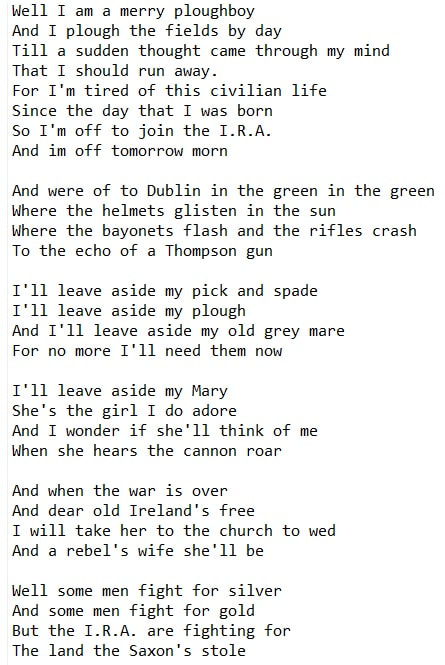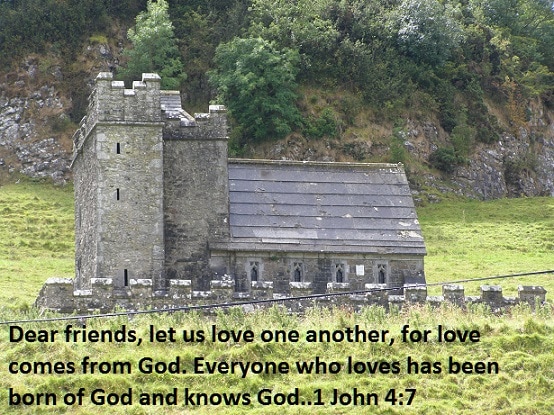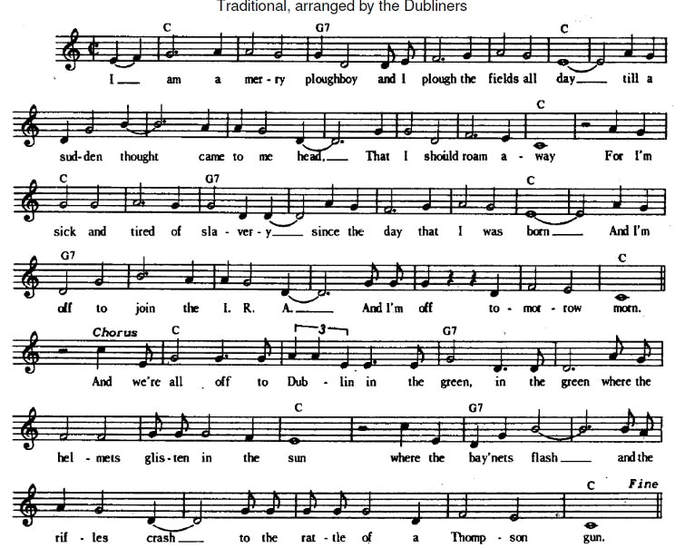The Merry Plough Boy Lyrics And Chords
Also included is the tin whistle notes in the key of D and the sheet music.. Written by Jeremiah Lynch . Recorded by Dominic Behan, The Dubliners , The Wolfe Tones , Dermot O'Brien , Eire Og , and Johnny McEvoy [ song lyrics ]. The sheet music notes are included and the guitar chords are in D with a version in G in chordpro. The youtube video is from 1974 and features The Dubliners with Ronnie Drew on vocals. This old ballad was out in the 1960's and it was then I learned it, at school. Yes, in them days we learned how to sing ballads in the classrooms in Ireland.
|
The Merry / Jolly Plough Boy Song Words And Guitar Chords In D Major
Well[D] I am a merry[A] ploughboy And I plough the fields by[D] day Till a[A] sudden thought came through my mind That I should[A7] run a[D]way. For[D] I'm tired of this[A] civilian life Since the[G] day that I was[D] born So I'm[A] off to join the I.R.A. And im off to[G]morrow[D] morn [Chorus] And[D] were of to[A] Dublin in the green in the green Where the helmets glisten in the[D] sun Where the bayonets[A] flash and the rifles crash To the echo of a[A7] Thompson[D] gun I'll leave aside my pick and spade I'll leave aside my plough And I'll leave aside my old grey mare For no more I'll need them now I'll leave aside my Mary She's the girl I do adore And I wonder if she'll think of me When she hears the cannon roar And when the war is over And dear old Ireland's free I will take her to the church to wed And a rebel's wife she'll be Well some men fight for silver And some men fight for gold But the I.R.A. are fighting for The land the Saxon's stole The Merry Ploughboy Tin Whistle Notes are by Jean-Baptiste Meynard, and so is the youtube video. F G A A B A A E E F G G A A F G F E A C A B A E A B A E F G F D F G A A B F G A A A E E F G G A A F G F E A C A B A E A B A E F G E D F G A A B A A E E F G G A A F G F E A C A B A E A A A E F G F D |
|
Here are a set of chords in the key of G
Well[G] I am a merry[D] ploughboy
And I plough the fields by[G] day
Till a[D] sudden thought came through my mind
That I should[D7] run a[G]way.
For[G] I'm tired of this[D] civilian life
Since the[C] day that I was[G] born
So I'm[D] off to join the I.R.A.
And im off to[C]morrow[G] morn
[Fhorus]
And[G] were of to[D] Dublin in the green in the green
Where the helmets glisten in the[G] sun
Where the bayonets[D] flash and the rifles crash
To the echo of a[D7] thompson[G] gun
Well[G] I am a merry[D] ploughboy
And I plough the fields by[G] day
Till a[D] sudden thought came through my mind
That I should[D7] run a[G]way.
For[G] I'm tired of this[D] civilian life
Since the[C] day that I was[G] born
So I'm[D] off to join the I.R.A.
And im off to[C]morrow[G] morn
[Fhorus]
And[G] were of to[D] Dublin in the green in the green
Where the helmets glisten in the[G] sun
Where the bayonets[D] flash and the rifles crash
To the echo of a[D7] thompson[G] gun
The merry ploughboy guitar chords and tab
Here's the sheet music for The Merry Ploughboy

![iRISH SONG [ FOLK ]](/uploads/4/3/3/6/43368469/editor/7166142.jpg?1555161571)



